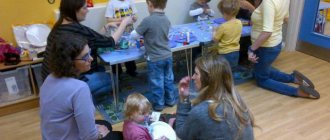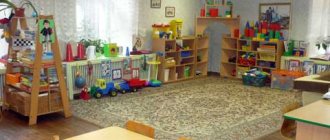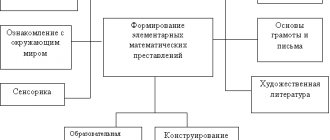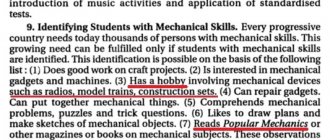MAGAZINE Preschooler.RF
Activities of professional communities of teachers of preschool educational organizationsEffective examples of the creation and development of professional communities of teachers of preschool educational organizations in the constituent entities of the Russian Federation are a number of information network and regional professional associations of educators as a social network of educators. Within the framework of this network there are the following professional associations of employees of preschool educational institutions:
methodological association of teachers-speech therapists of preschool educational institutions, methodological association of educators;
festival of pedagogical ideas “Open Lesson” , a network of creative teachers, within which communities work for heads of educational institutions and preschool teachers;
professional community “Methodists” , in which there are thematic and discussion platforms for interaction between senior educators, the Federal State Educational Standards for preschool education, and the problems of preschool correctional education are discussed.
An analysis of professional communities of preschool teachers in the Russian Federation was carried out at the federal and regional levels.
Based on the analysis, the following existing professional communities were identified, links to their current sites are presented in Table 1.
An objective assessment of the activities of professional communities of educators in children's educational organizations is part of an integral system of working with personnel in an educational organization. Assessing the effectiveness of the activities of professional communities of teachers of preschool educational organizations underlies the formation of an integrated approach to building effective forms of interaction between participants in the professional community and organizing its work.
Below is a list of existing effective forms of organizing professional communities of preschool teachers in the regions of the Russian Federation (Table 2).
As we can see, today a number of different forms of effective organization are used in the work of professional communities:
network professional community;
methodological association on the basis of a preschool educational institution or a group of preschool educational institutions;
regional association;
professional community of educators and managers of non-state preschool educational institutions.
The main problems of organizing the activities of professional communities in the Russian Federation are:
the lack of information platforms on the Internet for a number of associations (mainly methodological associations based on preschool educational institutions or groups of preschool educational institutions);
lack of interaction between professional associations of different forms and areas of activity (for example, between regional associations and professional associations of teachers of non-state preschool educational institutions);
lack of integration between professional associations of educators and associations of other categories of teaching staff of preschool educational institutions (music directors, junior educators, medical workers);
membership in the professional community is superficial and does not affect the results of the activities of educators (participation in competitions, organization of exhibitions, methodological publications, etc.);
in the activities of a number of communities there is a discrepancy between the goals and nature of the activities;
in most cases, there are no developed mechanisms for financing the activities of communities and encouraging community members (newsletters, participation in seminars, preferential subscriptions to specialized magazines, etc.);
there are no developed schemes, mechanisms and regulations for the interaction of professional communities and educational organizations, government bodies, research centers and institutes dealing with the problems of child psychology and pedagogy, developmental psychology;
low interest of professional communities in attracting sponsorship funds and resources for their development (except for professional communities of educators and heads of non-state preschool educational institutions);
lack of developed mechanisms for integrating professional communities into a unified system of interaction between government authorities and private companies.
Thus, when assessing the effectiveness of professional communities, an important role is played by the organization of communication mechanisms between participants, forms of exchange of experience, and methods of encouraging participants in professional associations. A serious problem remains the integration of professional communities and the development of effective models for organizing their activities. The condition for achieving these tasks is the identification of productive forms of cooperation between professional communities of preschool teachers, the development of methods and tools for assessing the effectiveness of the activities of professional communities of preschool teachers.
The role of professional communities of teachers of preschool educational organizations in the context of the introduction of the Federal State Educational Standard for Preschool Education is determined by the tasks set for preschool education in the Russian education system.
As noted in the State Program for the Development of Education for 2013-2020 (Resolution of the Government of the Russian Federation dated April 15, 2014 No. 295 “On approval of the state program of the Russian Federation “Development of Education” for 2013-2020”), the specifics of the development of preschool education are determined by the demographic situation and is aimed at working with an increased number of children.
The main indicators of the development of preschool education in the period 2013-2020 are:
increasing the availability of preschool education;
increasing the enrollment of children in preschool educational organizations;
increasing the number of children aged 5 years and older enrolled in additional education;
increasing the coverage of children aged 3 to 7 years covered by educational programs that comply with the new Federal State Educational Standard for Education;
increase in the number of children of private preschool organizations in the total number of children of preschool educational organizations.
Federal State Educational Standard for Preschool Education (Order of the Ministry of Education and Science of Russia dated October 17, 2013 No. 1155 “On approval of the federal state educational standard for preschool education” ) defines the main directions for the formation of the educational environment in which the interaction of a child and an adult takes place, taking into account the characteristics of the early childhood period. This environment should facilitate the child’s full enjoyment of childhood and its development.
The formation of an educational environment in accordance with the Federal State Educational Standard for Educational Education should be based on the specifics of the preschool period of child development and the systemic features of preschool education in the Russian Federation.
New quality standards for the provision of educational services, which are recorded in the Federal State Educational Standard for Education, form an innovative system of requirements for the professional competence and professional development of teachers of preschool institutions. In particular, clause 3 of the Federal State Educational Standard for Education determines that one of the main elements of creating a professional environment for preschool education is to promote the professional development of teaching staff. This leads to the need to ensure the professional development of teaching and management personnel: additional professional education, provision of advisory support to teachers and parents (legal representatives) on issues of education and child health (including inclusive education); providing organizational and methodological support, primarily regarding the interaction of children with peers and adults.
In the context of the introduction of the Federal State Educational Standard for Preschool Education and ensuring high standards of professional work for educators, the place and role of professional communities of educators and preschool leaders requires significant changes. The following areas of activity of professional communities become priority:
organizing and conducting advanced training and retraining for teachers of preschool educational organizations in accordance with the requirements of the Federal State Educational Standard for Education;
carrying out accreditation of the activities of non-state preschool educational organizations;
involving professional communities in the accreditation of state preschool educational organizations;
intensifying the activities of professional communities to attract sponsorship funds and resources for the development of the preschool education system in a given region, city, district;
implementation of public-private partnership mechanisms in the activities of professional communities (for example, concluding cooperation agreements with enterprises and companies regarding the screening and care of children of employees, the implementation of certain educational programs, pre-school training programs);
interaction with regional educational institutions, government bodies in terms of ensuring accessibility of preschool education and increasing the enrollment of children in preschool education programs;
methodological, advisory, psychological and pedagogical support for young educators;
formation of an information space, databases on issues of child psychology, didactic games, document flow in preschool educational institutions and other areas for teachers and directors of preschool educational institutions;
interaction with the population and the general public on issues of the quality of educational services provided and, as a result, increased satisfaction of the population with the quality of educational services;
participation of professional associations in attracting specialists and training personnel in additional education programs for preschool children.
In connection with the changing demographic situation in Russia and the increase in the number of children, there is a need for training and retraining of teaching staff to carry out professional activities in the current conditions. Professional communities are a flexible tool for organizing advanced training programs and organizing retraining in accordance with the requirements of the Federal State Educational Standard. In the future, professional communities can take on the function of advanced training and organizing retraining for the FE system.
There is an increase in the number of private kindergartens in the country, which leads to the need to control the quality of educational services provided. Today, professional communities are already implementing various accreditation programs and are developing criteria and guidelines for the accreditation of private preschool educational institutions and the certification of their employees. The urgent task is to develop mechanisms that allow professional associations to intensify participation in accreditation activities in this area.
The area of public-private partnership remains no less promising. Professional communities must have the tools to actively initiate the attraction of sponsorship funds into the preschool education system in the region, city, and district. Private companies and enterprises should be given the opportunity to fully participate in the activities of professional communities and boards of trustees of preschool educational institutions. In particular, professional communities can enter into cooperation agreements with enterprises and companies regarding the screening and care of employees’ children, the implementation of certain educational programs, and preschool programs for the children of employees of private companies.
Today, the activities of professional communities of educators are often semi-formal. It is necessary to develop mechanisms for interaction between professional associations of educators and heads of preschool educational institutions with regional educational institutions, government bodies in terms of ensuring the availability of preschool education and increasing the coverage of children in preschool education programs, and the participation of professional communities in the formation of educational policy.
In connection with the increase in the number of kindergartens, including non-state preschool educational institutions, and the planned increase in the salaries of preschool teachers, an influx of young specialists into the field of preschool education is envisaged. There is a need for methodological, advisory, psychological and pedagogical support for young educators through their participation in schools for young educators, forums for young specialists and other forms of practical training. A promising area of activity for professional communities is the implementation of various forms of mentoring and transfer of teaching experience for their participants, especially young educators.
In this regard, it is important to note the function of professional communities in the formation of an information space, databases on child psychology, didactic games, document flow in preschool educational institutions and other aspects of the activities of educators and preschool leaders, which is and will be one of the essential aspects of the work of professional associations.
Interaction with parent committees should become one of the priorities of professional communities. Representatives of the parent community should take a direct part in the work of professional communities, seminars, problem-based round tables, presentations, exhibitions, and be involved in solving organizational and pedagogical problems. Interaction with the population and the general public on issues of the quality of educational services provided will lead to increased public satisfaction with the quality of educational services.
The role of professional communities will also increase in the direction of their participation in vocational education, especially in terms of the network form of implementation of educational programs, providing practical training and pedagogical support for graduates of educational organizations of secondary and higher education who have mastered educational programs in the areas of psychological and pedagogical education, psychology and pedagogy of preschool education, etc.
In connection with the need to increase the coverage of preschool children in additional education programs, professional communities will act as organizational centers that will ensure the involvement of additional education specialists in preschool educational institutions and the necessary retraining of educators in additional education programs. Professional communities can also come up with their own programs for assessing the quality of additional education for children and conducting certification of additional education specialists for preschoolers.
The further development of the preschool education system in the context of the introduction of the federal state standard for preschool education and increasing requirements for the quality of professional work of educators necessitate the development of a system of professional communities as an important element in the formation of a professional environment. It will provide professional development for its participants and closely interact with the parent community, private companies and enterprises, educational authorities, and factors in the formation of educational policy.
Being an integral part of the organization of professional activities of teachers, professional communities are a tool for the implementation of lifelong learning for their participants, the growth of their pedagogical, managerial, information, and communication competencies.
Thus, it is possible to predict the strengthening of the role and place of professional communities of preschool teachers, which entails the development of new, more flexible forms of organizing professional communities and the intensification of their activities. The activities of professional communities are aimed at improving the qualifications of their participants, implementing public-private partnership mechanisms, practical training and pedagogical support for young educators, interaction with the population and the general public in matters of improving forms of work with children and improving the quality of preschool education.
| Next > |
Wikipedia - the free encyclopedia ru.wikipedia.org
Search by articles of the free universal encyclopedia
, written in Russian. Selected articles, interesting facts, the current day in history, links to thematic portals and related projects.
Currently, the number of pedagogical network communities is growing rapidly. Network communities are developing at the level of school, region, subject areas, and problems. Each teacher can decide independently which community to choose for himself. This gives him the opportunity for professional growth, starting from a simple observer of the life process of a network resource, to an expert, and maybe even an administrator of his own community.







